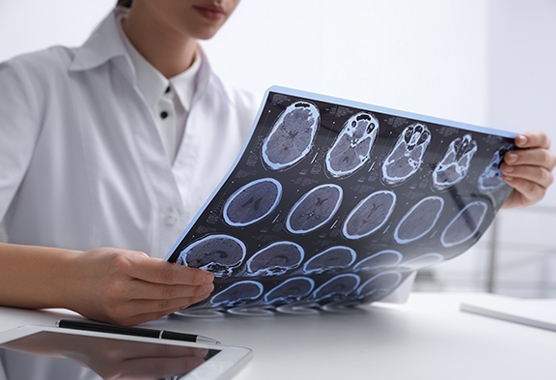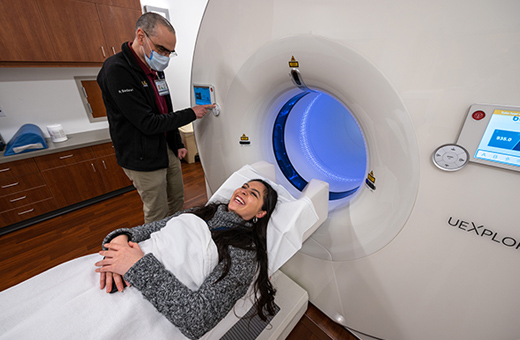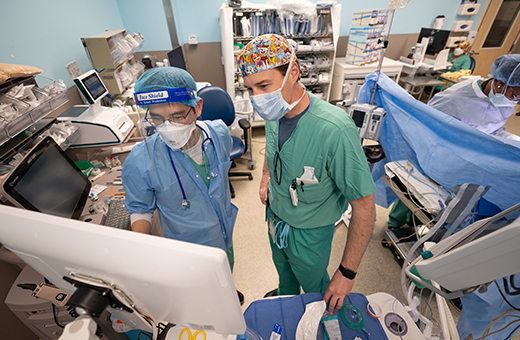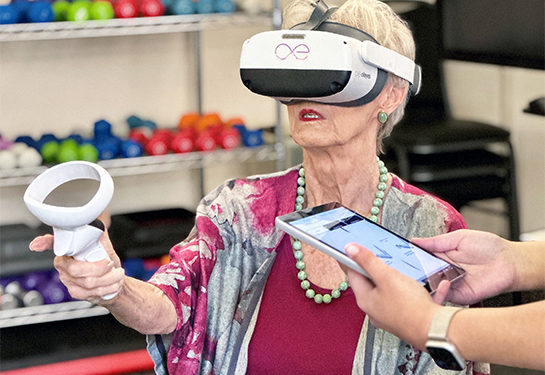Epilepsy Surgery
Specially trained neurosurgeons in our epilepsy program use the latest surgical techniques to reduce or fully eliminate seizures. We’re here to help you live better with epilepsy.
Medically reviewed by Julia Sharma, M.D. on Aug. 04, 2025.

Leading-Edge Epilepsy Surgery
Living with epilepsy can be challenging, and some people do not find relief from seizures with medication alone. For drug-resistant epilepsy, we offer the latest surgical treatments, including robot-assisted surgery, deep brain stimulation (DBS), responsive neurostimulation (RNS), and laser interstitial thermal therapy (LITT).
To help us understand your unique seizure experience and plan your surgery, you’ll spend time in our state-of-the-art epilepsy monitoring unit. We use the most advanced methods to map seizure activity in your brain. We explain the results, discuss your goals, and help you understand your treatment options.
We are a level 4 Comprehensive Epilepsy Center, the National Association of Epilepsy Centers' highest designation. This designation recognizes our ability to provide the most advanced, compassionate care available — including complex epilepsy surgery, specialized testing, and a full team of experts working together. We’re passionate about providing the highest level of epilepsy care.
Surgical Treatments for Epilepsy
Our expert neurosurgeons provide all available, effective surgical options for treating epilepsy, including precise robot-assisted procedures. Surgery and surgically placed neuromodulation devices can dramatically reduce or even eliminate seizures.
We’re one of the few epilepsy programs taking a lifespan approach to epilepsy care. This means our team includes experts in prenatal, pediatric, adolescent, and adult epilepsy care who work together to make your life stage transition seamless when it comes to your epilepsy care. For pregnant women, we offer specialized clinics to meet the unique needs of you and your baby.
In addition, our Neurology and Neurological Surgery research teams work hard to develop even better therapies and cures. This means that during your stay in the epilepsy monitoring unit, you may have the opportunity to participate in research activities. You may also be offered the option to participate in a clinical trial.
Surgical treatments for epilepsy that we offer include:
Deep Brain Stimulation (DBS)
We use complex navigational tools to precisely place small electrodes deep in your brain. These connect to a battery in your chest. DBS modulates electrical patterns to prevent seizures, like a pacemaker for your brain.
Responsive Neurostimulation
A responsive neurostimulation (RNS) device placed inside a small opening in your skull detects and stops seizures before they begin.
Vagus Nerve Stimulation
We place two small vagus nerve stimulation (VNS) electrodes around the vagus nerve in your neck. These connect to a battery under the skin of your chest near your collarbone. The electrodes stimulate the vagus nerve, causing it to send electrical signals to your brain that interrupt seizures.
Laser Interstitial Thermal Therapy
This minimally invasive treatment uses a tiny laser to treat the area of your brain that’s causing seizures. Treatment occurs in an MRI so that your surgeon can adjust the laser in real time to attain the highest accuracy. This approach protects the surrounding tissue, which makes it a great choice for treating seizure sources deep within the brain.
Hemispherotomy
When seizures impact one whole hemisphere of the brain, our surgeon will surgically disconnect your two brain hemispheres. By leaving the hemisphere in place while isolating it from the rest of the brain, we can prevent seizures.
Corpus Callosotomy
Sometimes people have what is called generalized epilepsy, which can cause atonic seizures, also known as "drop attacks." To prevent this kind of seizure, we use tools or a laser to make a cut down the center of the corpus callosum.
Surgical Resection
During this procedure, your surgeon removes sections of brain tissue where seizures begin. To ensure the highest accuracy, we may use a tool called electrocorticography (ECOG) to map the seizure focus and functional areas during surgery. This option is very effective for patients whose seizures originate in parts of the brain that can be removed without impacting function.
Request an Appointment
As Sacramento's No. 1 hospital, you'll benefit from unique advantages in primary care and specialty care. This includes prevention, diagnosis and treatment options from experts in 150 specialties.
Referring Physicians
To refer a patient, submit an electronic referral form or call.
800-4-UCDAVIS
Patients
Call to make an appointment.
Consumer Resource Center
800-2-UCDAVIS
We understand the significance of choosing to have epilepsy surgery, and we’re here to support you through every step. Before your procedure, we meet with you to explain the surgery, how to prepare, and what to expect. You will also have the opportunity to talk with someone who has gone through the same kind of epilepsy surgery and ask them questions.
We're committed to your lifelong well-being and continue to monitor your progress in the years after surgery.
-

Before Surgery
-

During Surgery
Your surgical team will shave the part of your head where they’ll make incisions. Most epilepsy surgeries occur under general anesthesia. Rarely, you may need to be awake for part of the surgery and asleep during the rest. In these cases, the area will be numbed so that you feel no pain while awake.
-

After Surgery
Most procedures require that you stay in the hospital so we can care for you as you recover. You’ll receive pain medication to keep you comfortable. Your recovery time depends on what type of procedure you have and is usually three to five days. We will explain what to expect as you recover and answer your questions.
Home Care After Epilepsy Surgery
Recovery from brain surgery takes time, so you'll need to plan to take it easy when you return home. You'll gradually return to your regular activities when your care team says it's safe.
If your surgeon placed a device, your care team will schedule follow-up appointments to insert the battery and program the device.
Incision Care
You will need to keep your incision clean and dry as it heals. Your team will let you know when to change the bandages.
Medications
If you receive prescription medications after surgery, take them as prescribed. Follow your team’s instructions for all medications.
Time Off
You will need to take several weeks off work and activities such as vigorous exercise. Your team will tell you when it’s safe to drive and resume other activities.
When to Contact Your Neurosurgeon
Call us if you have signs of infection around your incision, such as redness or swelling; fever; a headache that doesn’t go away; vision changes; confusion or a seizure. We’re here for you if you have any concerns as you’re recovering.

Ranked among the nation’s best hospitals
A U.S. News & World Report best hospital in cardiology, heart & vascular surgery, diabetes & endocrinology, ENT, geriatrics, neurology & neurosurgery, and pulmonology & lung surgery.

Ranked among the nation’s best children’s hospitals
U.S. News & World Report ranked UC Davis Children’s Hospital among the best in pediatric nephrology, orthopedics*, and pulmonology & lung surgery. (*Together with Shriners Children’s Northern California)

Ranked Sacramento’s #1 hospital
Ranked Sacramento’s #1 hospital by U.S. News, and high-performing in aortic valve surgery, back surgery (spinal fusion), COPD, colon cancer surgery, diabetes, gynecological cancer surgery, heart arrhythmia, heart failure, kidney failure, leukemia, lymphoma & myeloma, lung cancer surgery, pacemaker implantation, pneumonia, prostate cancer surgery, stroke, TAVR, cancer, orthopedics, gastroenterology & GI surgery, and urology.

The nation’s highest nursing honor
UC Davis Medical Center has received Magnet® recognition, the nation’s highest honor for nursing excellence.

World-class cancer care
One of ~59 U.S. cancer centers designated “comprehensive” by the National Cancer Institute.

A leader in health care equality
For the 13th consecutive year, UC Davis Medical Center has been recognized as an LGBTQ+ Healthcare Equality Leader by the educational arm of America’s largest civil rights organization.

